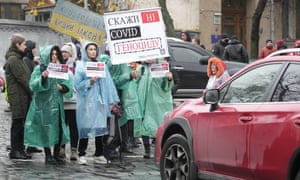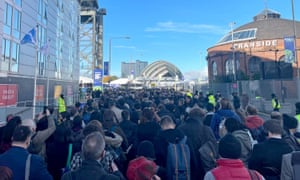
5.24am EDT05:24
South Korea to increase testing at schools over fears of teenage infection wave
South Korea has said it would ramp up Covid-19 testing at schools after a sharp rise of infections among children, weeks ahead of a plan to fully reopen schools nationwide.
The surge comes as new social distancing rules aimed at a phased return to normal came into effect on Monday as a part of the country’s plan to gradually move toward living with Covid-19.
South Korea has fully vaccinated nearly 90% of its adult population but only began inoculating children aged between 12 and 17 in recent weeks, administering just 0.6% of the age group with both doses so far.
“There is a growing concern as the frequency of new cluster outbreaks has been increasing, centred on educational facilities such as private tuition centres and schools,” Interior and Safety Minister Jeon Hae-cheol said, Reuters report.
The country reported 2,667 new cases for Tuesday, an increase of more than 1,000 from the day earlier. Nearly one-fourth of the new cases were found in teenagers, officials said.
“The teenagers spend a lot of time in communal living such as schools and tuition centres and they are also active in social activities,” Son Young-rae, a senior health ministry official, told a briefing.
“We believe that the risk of infection will inevitably rise and the confirmed cases will continue to surge stemming from these teenagers.”
5.14am EDT05:14
Prof Jonathan Van-Tam: Covid wave in UK ‘now starting to penetrate into older age groups’
England’s deputy chief medical officer, Prof Jonathan Van-Tam, has said he is worried that increasing numbers of deaths show “the infection is now starting to penetrate into older age groups”.
“Deaths are increasing – there might be some artefacts in the very latest figure – but essentially deaths are increasing,” PA Media quote him telling BBC Breakfast and BBC Radio 5 Live.
“If you then look at hospital admissions, those have plateaued in the last four days. And if you look at the total number of patients in hospital with Covid, those have gone down in the last two or three days, but only a small bit.
“So what that tells me is that we have to just wait and see a bit longer – this could be a pause before things go up, it could be the very first signs that things are beginning to stabilise but at a high rate.
“On cases, they are now starting to fall, but that mainly reflects the fact that this big wave we’ve had in teenagers is now starting to slip away. But my worry is that the deaths are increasing and that shows that the infection is now starting to penetrate into those older age groups.
4.57am EDT04:57
Ukraine health minister tells protestors: ‘anti-vaccination spirit quickly disappears in intensive care units’
Faced with rising case numbers, the Ukrainian government has enacted a series of anti-Covid measures. Teachers, government employees and other workers have been told to get fully vaccinated by 8 November or face having their salary payments suspended. In addition, proof of vaccination or a negative test is now required to board planes, trains and long-distance buses. That has led to protests in the street today in the capital Kyiv.

An Orthodox priest speaks to demonstrators as they gather to protest against Covid-19 restrictions in Kyiv, Ukraine. Photograph: Efrem Lukatsky/AP
Reuters report that Ukraine lagged behind other European countries in obtaining coronavirus vaccines earlier this year and is now struggling to persuade a sceptical public to take them.
“Such rallies of people that we see today, with calls not to get vaccinated, in my opinion, make a mockery of our doctors and families, who, unfortunately, have lost their relatives due to the coronavirus,” Ukrainian health minister Viktor Lyashko told a televised news conference.
“Trust me, this anti-vaccination spirit quickly disappears in intensive care units, and fake certificates don’t work,” he said.

Demonstrators hold posters reading “Say No to genocide” as they try to block a street during an anti-vaccination protest in Kyiv, Ukraine. Photograph: Efrem Lukatsky/AP
4.39am EDT04:39
Queues outside Cop26 in Glasgow ‘really concerning’ during pandemic – health expert
A health expert in Scotland has described the scenes of delegates queuing at the Cop26 conference in Glasgow as “really concerning” during a pandemic.
Prof Devi Sridhar, a professor of global public health at the University of Edinburgh, said seeing pictures of hundreds of people in close proximity has left her anxious knowing how “fragile” the situation has been.

Cop26 delegates wait in a long queue for entrance to the summit at the Scottish Exhibition Centre in Glasgow. Photograph: Daniel Barker/PA
PA Media report that, asked about the queues, Prof Sridhar told BBC Good Morning Scotland: “It is really concerning, this week I have been quite anxious seeing all that and knowing how fragile the situation has been.
“We’ve controlled the situation for quite a long time. Can we control it even after this big gathering? That’s the question. Will it lead to a spike, will it lead to a wave, will actually the mitigation measures have been enough?
“I know they thought a lot about making sure people were fully vaccinated, people were testing, it’s a really tricky one because obviously this is the worst timing ever during a pandemic, but at the same time I listened to those people who work in climate and they are saying now is the time, if not now we have an existential threat to humanity.”
Yesterday Scotland’s health secretary, Humza Yousaf, said “scale and worldwide draw” of the summit “poses a risk of spread of Covid-19 both within delegates and to or from the local population of Scotland and the UK”.
4.35am EDT04:35
The number of foreign tourists visiting Spain more than quadrupled in September from a year ago to nearly 4.7 million, official data showed as widespread vaccination and looser travel restrictions enticed back more visitors.
However, Reuters report that number was still far below the 8.8 million who came to Spain in September of 2019, before the coronavirus pandemic hit.
4.19am EDT04:19
Poland reported more than 10,400 Covid-19 cases on Wednesday, a 24% rise week on week, government spokesman Piotr Muller said.
Reuters note that the last time the number of daily infections in Poland was above 10,000 was in late April.
“Unfortunately over 10,400 infections have been reported today, that’s over 24% more than last week,” Muller told Radio Plus.
4.09am EDT04:09
Ukraine is also one of the countries towards the east of Europe that is seeing rising numbers of Covid cases. This morning the health ministry has reported 23,393 new cases, which is up on the previous day. The figures state that this number includes 1,406 children and 421 medics among the caseload. There were 720 further deaths, according to a statement the ministry posted on Facebook.
Ministry of Health of Ukraine
(@MoH_Ukraine)За весь період вакцинальної кампанії проведено понад 18 мільйонів щеплень!
За добу 02 листопада в Україні:
– зафіксовано 23 393 нових підтверджених випадків COVID-19;
– 310 439 людей вакциновано проти COVID-19.
Докладно: https://t.co/gJC0kZvekI pic.twitter.com/s2UZKuxwxL
3.59am EDT03:59
Czech Republic nears 10,000 new daily cases for first time since March
The number of daily Covid-19 cases reported in the Czech Republic neared 10,000 for the first time since March, health ministry data showed.
Reuters report the country recorded 9,902 new infections yesterday, up from 6,284 on the same day a week ago. Hospitalisations reached more than 2,000 for the first time since May, including 288 people in intensive care.
Yesterday the head of the Institute for Health Information and Statistics in the Czech Republic, Ladislav Dušek, told Czech Radio that the number of cases was less important than the number of hospitalisations, which he predicted would soon reach 3,000.
He also said that cases in the country were currently growing not among young people, as was the case in September, but among unvaccinated 30- to 50-year-olds.
3.34am EDT03:34
Economic secretary to the Treasury John Glen was asked about Covid in the UK on Sky News during his interview, and was pressed on two things in particular. Firstly he was asked about prime minister Boris Johnson saying he did not accept the premise that the UK was in a worse Covid situation than other comparable western European nations. Glen didn’t really have an answer for that – the numbers speak for themselves – he instead tried to simply go on about the success of the UK’s vaccination programme. Here is a map of case prevalence that clearly shows what an outlier the UK is – although both Belgium and the Netherlands have case numbers gathering pace.
Those vaccine figures don’t bear out Johnson or Glen’s argument though. The EU has collectively given one dose to 80.3% of eligible people, and has 75.2% of people fully vaccinated. The respective figures for the UK are 87% with a first dose and 79.5% fully vaccinated. So the UK rollout has performed better than the EU as a whole.
However, that EU-wide figure includes the extremely low rates in states such as Bulgaria and Romania, where the rate is about 27% and 40% respectively. The UK’s nearest neighbours, France and Ireland, both have higher first dose vaccination rates than the UK.
Secondly, the minister was pressed on what the situation with deaths and hospitalisations would have to be for the government to take action to enact “plan B” and introduce further Covid mitigation measures back to England.
He was unable to lay out that scenario, instead arguing that rates differed all over the country, that restrictions have consequences for people’s lives, and that the government continued to have a rolling discussion about the situation.
Updated
at 3.49am EDT
3.15am EDT03:15
President Duterte says local officials will be punished in Philippines over slow vaccine rollout
Philippines president Rodrigo Duterte said on Wednesday that local government officials will be punished for falling behind their targets for Covid-19 vaccinations.
The Philippines has so far fully immunised a little over a third of 77 million people eligible for shots. Duterte said there was no reason why daily vaccinations could not be ramped up to at least a million from an average of 500,000 since the country has sufficient stock of vaccines.
“We saw fault lines in the overall picture of our vaccination programme. I am not contented,” Duterte said in a recorded address.
Karen Lema reports for Reuters that Duterte said local officials “who are not performing nor using the doses given to them in a most expeditious manner” would be sanctioned and made accountable. He did not spell out penalties.
The government has been gradually easing Covid-19 curbs, and on Wednesday it announced it was lifting the nightly curfew imposed in the capital region from Thursday.
The seven-day average for new cases in the Philippines is around 4,000, down from a peak of about 21,000 in the peak of the last wave of the virus in mid-September.
Updated
at 3.54am EDT
3.08am EDT03:08
Hello, it is Martin Belam here in London. I imagine much of the UK morning media will be dominated by Cop26 in Glasgow rather than Covid, but I will bring you any lines that emerge from the early interviews. There may be some fallout from the resignation of Sir Jeremy Farrar from the Scientific Advisory Group for Emergencies (Sage), which emerged yesterday. John Glen, the economic secretary to the Treasury, is the government minister being put up for interviews today. Here is the latest UK Covid data.
Updated
at 3.54am EDT
2.55am EDT02:55
The Netherlands reintroduces Covid curbs as cases rise
The Netherlands is bringing back coronavirus measures including a requirement for face masks in many public spaces to combat a surge in cases, prime minister Mark Rutte said on Tuesday.
He said the government will be reintroducing social distancing rules, extending so-called Covid passes to places such as museums and restaurant terraces, AFP reports.
People are also being advised to work from home for at least half the week and avoid rush-hour travel.
The move – which makes the Netherlands one of the first in western Europe to bring back restrictions – comes less than two months after it drastically relaxed anti-Covid measures.
Infections have since been rising for a month after most social distancing measures were scrapped in late September,
“It won’t surprise anyone that we have a difficult message tonight. Infections and hospital admissions are rising quickly,” Rutte told a press conference.
The Netherlands had some of Europe’s most lax restrictions early in the pandemic but drastically tightened up during a brutal second wave last year.
Rutte said masks would be required again in shops and for professions including hairdressers and massage parlours. They were already still obligatory on public transport, although not in stations or on platforms.
Sex workers in the Netherlands – where prostitution is legal – will continue to be excluded from the mask rule.
Updated
at 3.02am EDT
2.40am EDT02:40
Here’s a fun story out of New Zealand today.
Seven gang leaders, representing four of the countries most well-known street gangs, joined forces in a video urging their communities to get vaccinated.
The video was commissioned by the minister for Maori development, Willie Jackson, after a discussion with gang leaders, who then provided footage that was edited by Jackson’s son, Hikurangi, the Herald reported.
In the four-minute video, Denis O’Reilly, who joined the Black Power gang aged 19, says he had “taken a few shots” in his time, including the two shots against Covid-19, and he is asking his community “to do the same”.
Read the full story here.
2.24am EDT02:24
Hi and welcome back to our global Covid blog.
I’m Samantha Lock and I’ll be reporting from Sydney, Australia, to bring you all the latest developments from around the world.
Less than two months after drastically relaxing Covid restrictions, the Netherlands has become one of the first countries in western Europe to bring back them back again.
Faced with sharply rising coronavirus cases, the prime minister Mark Rutte said the Dutch government would be reinstating an order to wear face masks in public places and mandating an extension for the use of Covid passes in light of rapidly increasing case counts.
The country’s public health institute reported Tuesday that confirmed infections rose 39% compared to the week before and hospital admissions were up 31%.
Tighter curbs are also expected in China after the National Health Commission reported Covid cases surged to a near 3-month high with 93 new local symptomatic cases recorded for Tuesday, up from 54 a day earlier.
A key gathering of the highest-ranking members of the Communist Party in Beijing is expected to go ahead next week.
Here’s a round-up of the Covid headlines you might have missed.
- Australia may soon welcome foreign workers back into the country. NSW premier has pushed for further border re-openings as the state grapples with skilled labour shortages after 18 months of closed borders.
- Australia also remains on track to reach 80% of the population over 16 being fully vaccinated against Covid-19 in a matter of days.
- The Dutch government has reintroduced face masks in an attempt to stop rising Covid-19 cases. Prime minister Mark Rutte said the use of Covid passports would also be broadened out to include museums, gyms and outdoor terraces. The advice comes amid a major surge in new cases in the Netherlands.
- The UK has had its highest number of daily Covid deaths reported since late February, as another 293 people have died within 28 days of a positive Covid-19 test.
- UK government is increasingly worried that hospitalisations and deaths among double-vaccinated people could rise due to waning immunity as an estimated 4.5 million people have failed to get their booster shots despite being eligible.
- The US Centres for Disease Control and Prevention (CDC) unanimously voted in favour of the broad use of Pfizer and BioNTech jabs for children as young as 5. The shots could be administered as soon as Wednesday.
- China has urged its citizens to stockpile daily necessities, prompting panic-buying, amid surging vegetable prices linked to recent extreme weather, fears of supply shortages and an ongoing Covid outbreak.
- Romania broke its daily death toll record, after another 591 people died from Covid. It has lagged behind on vaccinations and is well below the average within the EU.
- Russia also set another daily record for Covid deaths reporting 1,178 on Tuesday.
- Greece announced new restrictions on non-vaccinated people and increased fines for non-compliance after reporting a daily record high of Covid-19 cases on Tuesday.
- Public health officials in Ireland say that its case numbers are at their highest point since January, as another 3,726 were registered – 70% higher than a week ago.
- A scientist has quit the UK government’s pandemic advisery body Sage, saying that the Covid crisis is “a long way from over”. Sir Jeremy Farrar, quit the body at the end of October.
- The UK government’s independent vaccine advisers recommended against Covid shots for healthy teenagers despite considering evidence that the jabs would reduce infections, hospitalisations and some deaths in the age group.


